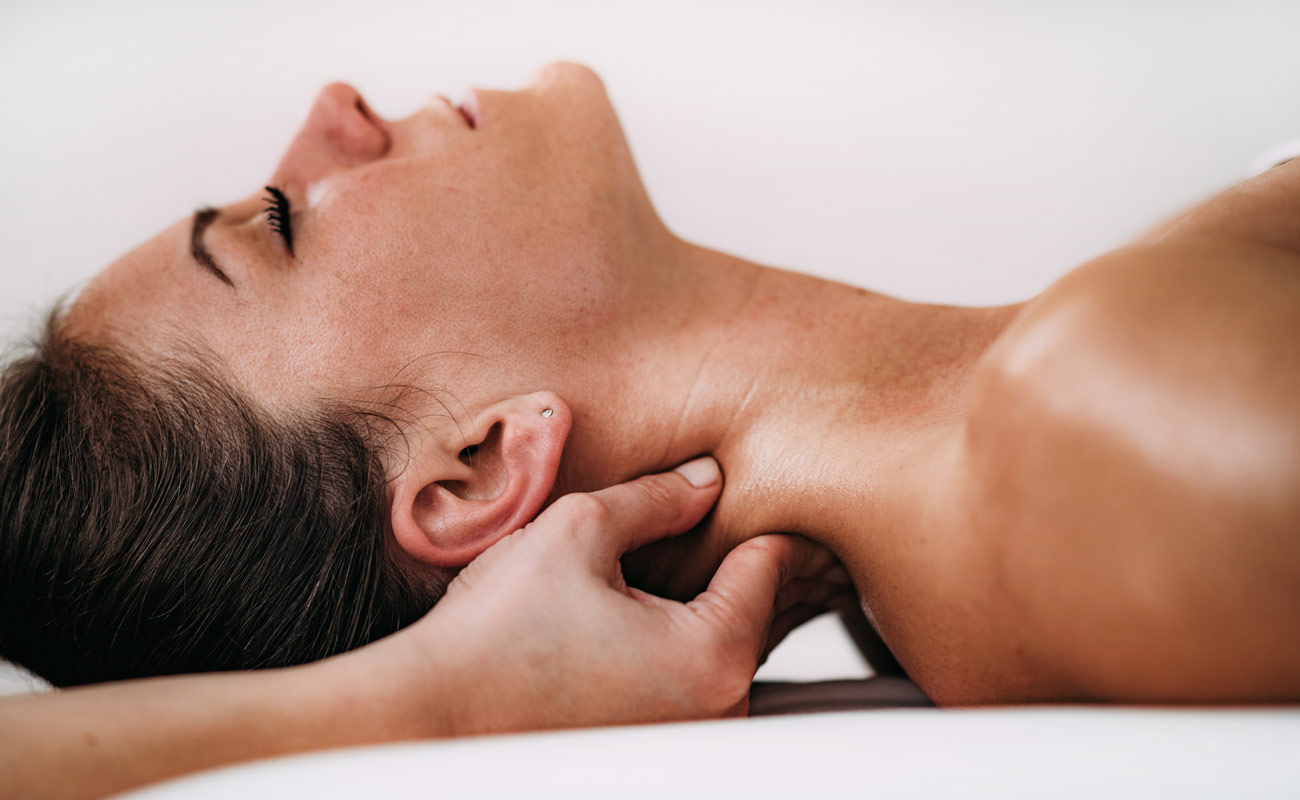When getting a massage, there’s nothing better than feeling that your therapist knows exactly what you need. But even the most skilled bodywork professional still (probably) isn’t a mind-reader. That’s why, as in any relationship, communication is key. Colorado massage therapist Melanie Peddle tells us the most important things to share with your massage provider—and how it helps ensure the most beneficial treatment for your unique needs.
Are you allergic or sensitive to lotion/oil ingredients?
Why it matters: Massage therapists want to know so that they don’t use a lubricant that will cause an allergic reaction. While some reactions are mild and just cause some hives or redness, other reactions can be severe and potentially deadly. If you know of substances that cause skin irritation or any other types or reactions, you should let your therapist know.
There are a myriad of ingredients in massage lotions, including but not limited to ingredients or byproducts of glycerin, tree oils, nuts, fragrances, fruit extracts, chemical additives, bee products, and even shellfish. So even being a strict vegan is worth letting your therapist know, to make sure everything goes smoothly right out of the gate.
Have you had any injuries or surgeries that still affect your body?
Why it matters: It could have occurred yesterday or decades ago, but anything about your body that deviates from “normal” will be something to let your therapist know. For example, you may have a joint with either restricted range of motion or painful range of motion. Letting your therapist know about this will prevent the therapist from moving that joint into a painful range.
Additionally, if it is something you want to work on, it lets your therapist know to focus there. If you are under movement restrictions from a doctor, surgeon, or a physical therapist, you should also let your massage therapist know, even if it doesn’t seem related to the current session (for example, if you aren’t allowed to go biking because your herniated disc in your lower back flares up when you do), your therapist will need to know that (in the above example, your therapist may focus extra on your anterior neck to encourage your head to sit more on top of your spine, which would relieve pressure on your lower back. Additionally, lower back work may be contraindicated (contraindicated = something that suggests the therapist in most circumstances shouldn’t massage there), as the muscles surrounding that area may be “splinting” which is when the muscles get extra tight and strong and stiff to help hold the spine up around the disc.
How do you use your body typically?
Why it matters: Do you work at a computer? Do you work on your feet all day? Are you driving most of your day? Do you run long distances for recreation All of these clues will help the therapist identify common pain patterns in your body. With this knowledge the therapist will be able to give you a customized massage that is best for your body and activities.
What are your goals for the current session?
Why it matters: Your therapist wants you to be satisfied with your massage. If you want a deep tissue massage that focuses on your hips and legs but your therapist assumes you want a relaxing, light, Swedish massage, you will be frustrated with the massage. You likely won’t rebook with the same therapist, and that therapist will not know why and will also be frustrated. It is better for both you and the therapist for you to communicate what your goals are for the upcoming session.
Are there any areas you specifically don’t want massaged?
Why it matters: Adding to the above, your therapist wants you to receive a great massage. If that includes not massaging anything, say, below your ankles or near your neck, the therapist will be happy to accommodate that request. Other common requests include no face, no head or hair, and avoiding acute injuries.
Are you pregnant?
Why it matters: If you are pregnant, even if you are not showing yet, laying facedown or faceup can be unusually uncomfortable. Your therapist will ask how far along you are and typically after about 11 weeks or so, you will be massaged mostly in side-lying positions. Additionally your therapist will want to know you’re pregnant so they know to check in more frequently and adjust the massage as needed.
Do you have painkillers in your system currently?
Why it matters: If you currently have painkillers dulling pain, you will be less sensitive to the pressure the therapist is using and less able to alert the therapist if they are massaging too deep. If you say “yes” to this question, the therapist will perform a lighter massage to err on the side of caution so as to not cause injury.
Are you taking any other medication?
Why it matters: Some side effects from medications can affect your massage. For example, blood thinners like warfarin make you more prone to bruises and could indicate DVT risk. Other medications make you more prone to dizziness or orthostatic hypotension (lightheadedness or fainting upon standing), which may mean you will need assistance or extra time getting off the table after the massage. Let your therapist know what medications you are currently taking so they can adjust the massage, if needed.
What music do you want to listen to?
Again, this is your massage. Sometimes the therapist has a basic playlist for the massage (this is usually “spa music” or something calming without lyrics), but, thanks to smartphones and the internet, the therapist can likely play any genre you want. Or nothing at all, so don’t feel shy about mentioning it!
Melanie Peddle holds a MS in Mechanical Engineering and has been practicing massage since 2012. She is an instructor with Western Colorado University in its partnership with the University of Colorado, focusing on biomechanical engineering and injury, as well as applications in adaptive sports. An accomplished collegiate athlete, Melanie brings an engineer's mind to all her physiological pursuits, and a passion for the most interesting engineering challenge of all: the human body.







